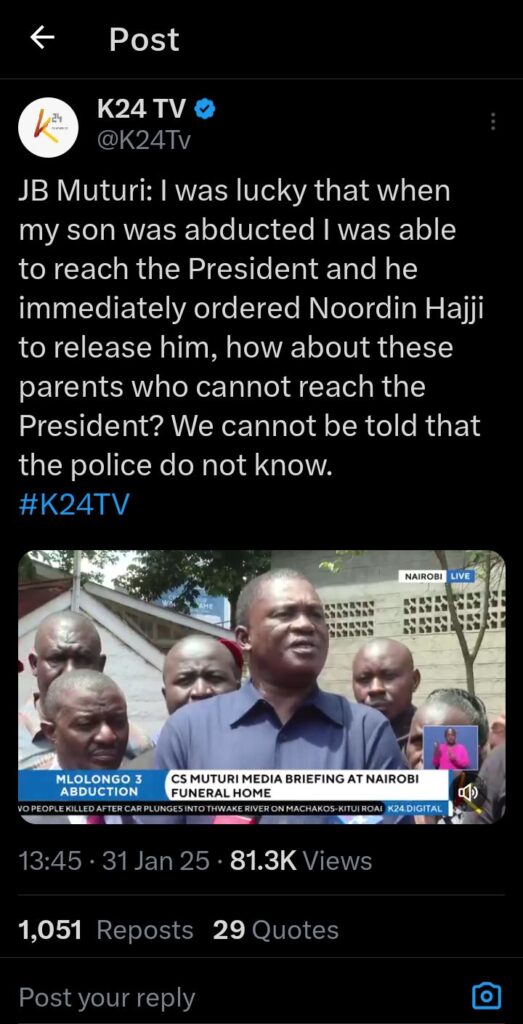Noordin Haji’s leadership at the National Intelligence Service (NIS) has come the talk of the day following shocking revelations by Public Service Cabinet Secretary Justin Muturi.
Muturi’s testimony about the abduction of his son, Leslie, has exposed the dark operations of the NIS, which appears to have turned into a rogue agency specializing in abductions and human rights violations.
Haji, who was once Kenya’s Director of Public Prosecutions, has transformed the intelligence service into an institution feared for its brutality rather than respected for its mandate to protect the country.
Muturi’s account revealed how his son was kidnapped by masked men, only to later discover that the abduction was orchestrated by the very agency tasked with national security.
The fact that Muturi had to personally reach out to President Ruto to secure his son’s release raises alarming questions about the unchecked power Haji wields over the intelligence service.
If a high-ranking Cabinet Secretary’s son could be taken without any formal explanation, what happens to ordinary Kenyans who have no direct access to the President? Muturi’s concerns over the fate of those without powerful connections highlight a terrifying reality NIS, under Haji, has become a law unto itself.

The timing of Leslie’s abduction is also telling. It came at a time when young Kenyans were demonstrating against government policies, demanding accountability and fairness.
Reports of other activists and protesters disappearing under mysterious circumstances further indicate that the NIS is being used as a tool of repression.
Rather than gathering intelligence for national security purposes, Haji’s agency has seemingly shifted focus to silencing dissent through fear and intimidation.
The sheer number of missing persons since the protests began suggests that the NIS is not merely detaining people for questioning but may be involved in enforced disappearances and possibly extrajudicial killings.
Under Haji’s watch, intelligence officers no longer seem to be working within the confines of the law.
The secrecy surrounding these abductions, the failure to provide answers to families, and the absolute silence from the NIS indicate that the agency operates with impunity.
When security forces are feared more than criminals, it signals a dangerous collapse of law and order. Haji’s leadership has transformed the intelligence service into an institution that serves political interests rather than the security needs of the Kenyan people.
The criticism against Haji has been dismissed by some government figures who claim that individuals like Leslie Muturi were arrested for minor offenses.
However, this narrative fails to explain why so many others have disappeared without a trace. The Kenya National Commission on Human Rights has documented dozens of cases where people were abducted, never to be seen again.
The silence from Haji and his agency on these cases speaks volumes. If there was no wrongdoing, why has the NIS failed to clarify what happened to those missing?
Haji’s tenure at the NIS raises concerns about the misuse of intelligence agencies for political purposes. Instead of focusing on genuine threats to national security, his leadership appears to be targeting critics, activists, and anyone seen as a threat to the government.
This shift not only erodes public trust but also paints Kenya as a country sliding into state-sponsored oppression.
Investors and international organizations are likely watching these developments closely, and continued reports of abductions and possible extrajudicial killings will inevitably harm Kenya’s global standing.
Kenya has experienced dark periods before, where state agencies were used to suppress opposition voices. However, the scale of abductions under Haji’s NIS is alarming and reminiscent of the worst days of past regimes.
If unchecked, this trend could see Kenya return to an era where security forces operate with complete disregard for the law and human rights.
Haji’s failure to rein in these abuses or worse, his alleged direct involvement in them makes him unfit to lead such a critical institution.
The responsibility now falls on the government to take decisive action. The first step should be a thorough investigation into the NIS’s role in abductions and killings.
Parliament and human rights organizations must demand accountability from Haji and his agency. If found guilty of overseeing these abuses, Haji must be removed and prosecuted for turning a state agency into a tool of oppression.
Muturi’s case has pulled back the curtain on a rogue intelligence service operating under Haji’s command. If one of Kenya’s top government officials had to fight to get his son back, what chance do ordinary citizens have? The evidence suggests that NIS is no longer serving the people but instead operating as a terror unit against them.
Unless immediate action is taken, Haji will continue running an agency that abducts, tortures, and possibly kills, unchecked and unchallenged.





















Add Comment